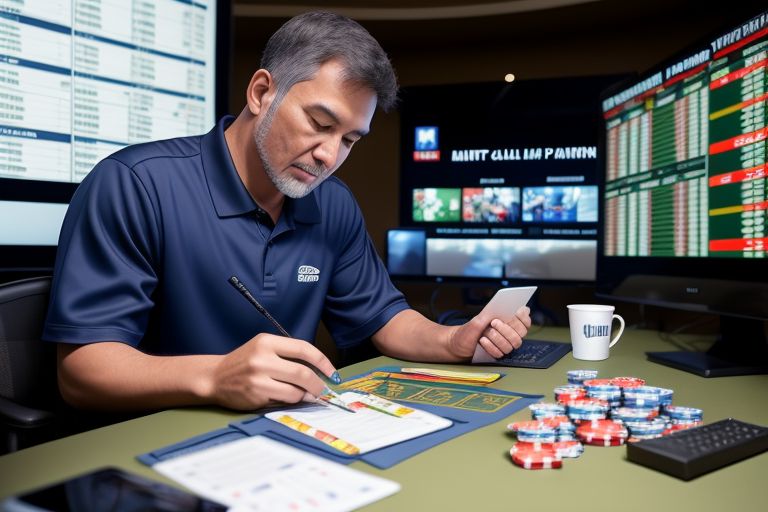Dec 14, 2024
Understand and Avoid the 5 Most Common Sports Betting Traps in 2025



The sports betting industry is undergoing a seismic shift as technological advancements and broader legalization continue to redefine the landscape. By 2025, the accessibility of betting platforms has skyrocketed, attracting participants from all walks of life. While this surge creates exciting opportunities, it also exposes many bettors to avoidable mistakes. Whether you're a seasoned professional or a newcomer, understanding the five most common sports betting traps can save you from financial setbacks and emotional strain.
Avoiding these pitfalls is more than just a strategy—it's a discipline. By learning how to approach betting for profit with a focus on rationality and preparation, bettors can optimize their long-term outcomes while still enjoying the thrill of the game.
Trap 1: Overvaluing Intuition Over Data
For many, the excitement of sports betting lies in the adrenaline rush of making a "gut call." It feels empowering to trust your instincts, especially when watching a team or athlete you've followed closely. However, intuition often leads to overconfidence, a cognitive bias that clouds judgment and results in poor decision-making.
Successful bettors understand that data is their most reliable ally. Analytical tools, algorithms, and historical data provide critical insights into player performance, team dynamics, and market trends. For instance, value bets—where the odds offered are better than the actual probability of an event occurring—are rooted in statistical analysis rather than hunches. Bettors who leverage these tools gain a measurable advantage over those who rely solely on intuition.
Analyzing contextual data—such as weather, player fatigue, or travel schedules—reveals critical insights often overlooked by novice bettors. Resources like betting for profit can refine strategies to include broader variables, increasing success rates and reducing reliance on gut instincts alone.
Trap 2: Chasing Losses
Few experiences are more disheartening than enduring a losing streak. The temptation to chase losses—to place increasingly larger bets in an effort to recoup what was lost—can be overwhelming. Yet, this behavior often leads to a vicious cycle of mounting debt and emotional distress.

This phenomenon is rooted in the "sunk cost fallacy," where individuals irrationally invest more resources into a losing proposition because they feel they've already committed too much to walk away. Chasing losses drains your bankroll and clouds your judgment, leading to impulsive and poorly considered bets.
To avoid this trap, establish strict betting limits and stick to them, even during losing streaks. Viewing losses as part of the overall betting journey rather than a personal failure can help maintain perspective. Patience and consistency are far more effective than desperation in achieving long-term success.
Trap 3: Ignoring Bankroll Management
Bankroll management is the backbone of any successful betting strategy. Without a clear plan for how much to wager and, as importantly, when, even the most skilled bettors can face financial ruin. Yet, many ignore this critical aspect, often betting more than they can afford to lose or failing to account for variance.
A common mistake is placing large bets relative to your total bankroll, leaving little room to recover from losses. Instead, adopt a percentage-based approach. For instance, wagering 1–2% of your bankroll per bet ensures sustainability during inevitable downturns.
Additionally, maintaining a "reserve bankroll" separate from your active betting funds can provide a safety net for periods of unexpected losses. Regularly reassessing your bankroll and adjusting your percentage-based bets based on performance ensures you stay adaptive to fluctuating circumstances. Tools like spreadsheets or specialized bankroll management apps can also help track your wagers and enforce discipline.
Trap 4: Falling for the Gambler’s Fallacy
The gambler's fallacy—the belief that a specific outcome is "due" because it hasn't occurred recently—is a cognitive trap that ensnares many bettors. For example, one might irrationally believe a win is imminent after witnessing several consecutive losses. This mindset ignores the independence of events, particularly in sports, where countless variables influence outcomes.
To counteract this fallacy, focus on the present probabilities rather than past patterns. For instance, a team's previous losing streak may have little bearing on their chances of winning a future match, especially if key players have returned from injury or the opposition's strategy has changed.
Understanding probability requires not just theoretical knowledge but also practical application. Breaking down events into smaller, independent probabilities helps bettors assess outcomes objectively. Using tools like simulators or probability calculators can deepen your understanding of randomness and reduce reliance on patterns that may be illusory. Resources such as sports betting tips for beginners offer actionable insights into identifying probabilities and minimizing reliance on faulty logic.
Trap 5: Misunderstanding Value in Bets
The concept of value is often misunderstood in sports betting. Many bettors equate high odds with high returns, overlooking the underlying probabilities determining a bet's value. As a result, they may prioritize flashy, long-shot wagers over calculated, data-backed bets.
True value lies in finding discrepancies between a sportsbook's odds and the real likelihood of an event occurring. For example, if a team's implied probability of winning is 40%, but the sportsbook's odds suggest a 30% chance, there is value in that bet. Identifying these opportunities requires research, statistical analysis, and market awareness.
To improve your understanding of value, explore resources like sports betting tips for beginners, which provide actionable guidance on recognizing profitable wagers. Mastering this concept can transform casual betting into a disciplined, profit-oriented pursuit.
The Winning Edge: Mastering the Art of Smart Betting in 2025
As the sports betting arena evolves, one truth remains constant: success isn’t about luck but preparation, discipline, and insight. By understanding and avoiding the five common traps outlined here, you position yourself miles ahead of the average bettor.
The allure of intuitive decisions, the spiral of chasing losses, the neglect of bankroll management, the false logic of the gambler’s fallacy, and the misunderstanding of value bets are all challenges even seasoned bettors face. Yet, each represents an opportunity to grow, adapt, and refine your strategy.
To truly master the art of betting, combine analytical precision with emotional resilience. Employ tools and techniques that deepen your understanding of odds, probabilities, and market trends. Success lies not in chasing improbable windfalls but in building consistent habits that align with long-term profitability.
Ultimately, the goal isn’t just to beat the odds—it’s to approach every decision with confidence, clarity, and control. Whether you’re placing your first bet or refining a well-honed strategy, a commitment to thoughtful betting practices will protect your bankroll and enhance your overall experience. Make 2025 the year you bet smarter, not harder, and embrace the rewards of disciplined, informed betting.
The sports betting industry is undergoing a seismic shift as technological advancements and broader legalization continue to redefine the landscape. By 2025, the accessibility of betting platforms has skyrocketed, attracting participants from all walks of life. While this surge creates exciting opportunities, it also exposes many bettors to avoidable mistakes. Whether you're a seasoned professional or a newcomer, understanding the five most common sports betting traps can save you from financial setbacks and emotional strain.
Avoiding these pitfalls is more than just a strategy—it's a discipline. By learning how to approach betting for profit with a focus on rationality and preparation, bettors can optimize their long-term outcomes while still enjoying the thrill of the game.
Trap 1: Overvaluing Intuition Over Data
For many, the excitement of sports betting lies in the adrenaline rush of making a "gut call." It feels empowering to trust your instincts, especially when watching a team or athlete you've followed closely. However, intuition often leads to overconfidence, a cognitive bias that clouds judgment and results in poor decision-making.
Successful bettors understand that data is their most reliable ally. Analytical tools, algorithms, and historical data provide critical insights into player performance, team dynamics, and market trends. For instance, value bets—where the odds offered are better than the actual probability of an event occurring—are rooted in statistical analysis rather than hunches. Bettors who leverage these tools gain a measurable advantage over those who rely solely on intuition.
Analyzing contextual data—such as weather, player fatigue, or travel schedules—reveals critical insights often overlooked by novice bettors. Resources like betting for profit can refine strategies to include broader variables, increasing success rates and reducing reliance on gut instincts alone.
Trap 2: Chasing Losses
Few experiences are more disheartening than enduring a losing streak. The temptation to chase losses—to place increasingly larger bets in an effort to recoup what was lost—can be overwhelming. Yet, this behavior often leads to a vicious cycle of mounting debt and emotional distress.

This phenomenon is rooted in the "sunk cost fallacy," where individuals irrationally invest more resources into a losing proposition because they feel they've already committed too much to walk away. Chasing losses drains your bankroll and clouds your judgment, leading to impulsive and poorly considered bets.
To avoid this trap, establish strict betting limits and stick to them, even during losing streaks. Viewing losses as part of the overall betting journey rather than a personal failure can help maintain perspective. Patience and consistency are far more effective than desperation in achieving long-term success.
Trap 3: Ignoring Bankroll Management
Bankroll management is the backbone of any successful betting strategy. Without a clear plan for how much to wager and, as importantly, when, even the most skilled bettors can face financial ruin. Yet, many ignore this critical aspect, often betting more than they can afford to lose or failing to account for variance.
A common mistake is placing large bets relative to your total bankroll, leaving little room to recover from losses. Instead, adopt a percentage-based approach. For instance, wagering 1–2% of your bankroll per bet ensures sustainability during inevitable downturns.
Additionally, maintaining a "reserve bankroll" separate from your active betting funds can provide a safety net for periods of unexpected losses. Regularly reassessing your bankroll and adjusting your percentage-based bets based on performance ensures you stay adaptive to fluctuating circumstances. Tools like spreadsheets or specialized bankroll management apps can also help track your wagers and enforce discipline.
Trap 4: Falling for the Gambler’s Fallacy
The gambler's fallacy—the belief that a specific outcome is "due" because it hasn't occurred recently—is a cognitive trap that ensnares many bettors. For example, one might irrationally believe a win is imminent after witnessing several consecutive losses. This mindset ignores the independence of events, particularly in sports, where countless variables influence outcomes.
To counteract this fallacy, focus on the present probabilities rather than past patterns. For instance, a team's previous losing streak may have little bearing on their chances of winning a future match, especially if key players have returned from injury or the opposition's strategy has changed.
Understanding probability requires not just theoretical knowledge but also practical application. Breaking down events into smaller, independent probabilities helps bettors assess outcomes objectively. Using tools like simulators or probability calculators can deepen your understanding of randomness and reduce reliance on patterns that may be illusory. Resources such as sports betting tips for beginners offer actionable insights into identifying probabilities and minimizing reliance on faulty logic.
Trap 5: Misunderstanding Value in Bets
The concept of value is often misunderstood in sports betting. Many bettors equate high odds with high returns, overlooking the underlying probabilities determining a bet's value. As a result, they may prioritize flashy, long-shot wagers over calculated, data-backed bets.
True value lies in finding discrepancies between a sportsbook's odds and the real likelihood of an event occurring. For example, if a team's implied probability of winning is 40%, but the sportsbook's odds suggest a 30% chance, there is value in that bet. Identifying these opportunities requires research, statistical analysis, and market awareness.
To improve your understanding of value, explore resources like sports betting tips for beginners, which provide actionable guidance on recognizing profitable wagers. Mastering this concept can transform casual betting into a disciplined, profit-oriented pursuit.
The Winning Edge: Mastering the Art of Smart Betting in 2025
As the sports betting arena evolves, one truth remains constant: success isn’t about luck but preparation, discipline, and insight. By understanding and avoiding the five common traps outlined here, you position yourself miles ahead of the average bettor.
The allure of intuitive decisions, the spiral of chasing losses, the neglect of bankroll management, the false logic of the gambler’s fallacy, and the misunderstanding of value bets are all challenges even seasoned bettors face. Yet, each represents an opportunity to grow, adapt, and refine your strategy.
To truly master the art of betting, combine analytical precision with emotional resilience. Employ tools and techniques that deepen your understanding of odds, probabilities, and market trends. Success lies not in chasing improbable windfalls but in building consistent habits that align with long-term profitability.
Ultimately, the goal isn’t just to beat the odds—it’s to approach every decision with confidence, clarity, and control. Whether you’re placing your first bet or refining a well-honed strategy, a commitment to thoughtful betting practices will protect your bankroll and enhance your overall experience. Make 2025 the year you bet smarter, not harder, and embrace the rewards of disciplined, informed betting.
The sports betting industry is undergoing a seismic shift as technological advancements and broader legalization continue to redefine the landscape. By 2025, the accessibility of betting platforms has skyrocketed, attracting participants from all walks of life. While this surge creates exciting opportunities, it also exposes many bettors to avoidable mistakes. Whether you're a seasoned professional or a newcomer, understanding the five most common sports betting traps can save you from financial setbacks and emotional strain.
Avoiding these pitfalls is more than just a strategy—it's a discipline. By learning how to approach betting for profit with a focus on rationality and preparation, bettors can optimize their long-term outcomes while still enjoying the thrill of the game.
Trap 1: Overvaluing Intuition Over Data
For many, the excitement of sports betting lies in the adrenaline rush of making a "gut call." It feels empowering to trust your instincts, especially when watching a team or athlete you've followed closely. However, intuition often leads to overconfidence, a cognitive bias that clouds judgment and results in poor decision-making.
Successful bettors understand that data is their most reliable ally. Analytical tools, algorithms, and historical data provide critical insights into player performance, team dynamics, and market trends. For instance, value bets—where the odds offered are better than the actual probability of an event occurring—are rooted in statistical analysis rather than hunches. Bettors who leverage these tools gain a measurable advantage over those who rely solely on intuition.
Analyzing contextual data—such as weather, player fatigue, or travel schedules—reveals critical insights often overlooked by novice bettors. Resources like betting for profit can refine strategies to include broader variables, increasing success rates and reducing reliance on gut instincts alone.
Trap 2: Chasing Losses
Few experiences are more disheartening than enduring a losing streak. The temptation to chase losses—to place increasingly larger bets in an effort to recoup what was lost—can be overwhelming. Yet, this behavior often leads to a vicious cycle of mounting debt and emotional distress.

This phenomenon is rooted in the "sunk cost fallacy," where individuals irrationally invest more resources into a losing proposition because they feel they've already committed too much to walk away. Chasing losses drains your bankroll and clouds your judgment, leading to impulsive and poorly considered bets.
To avoid this trap, establish strict betting limits and stick to them, even during losing streaks. Viewing losses as part of the overall betting journey rather than a personal failure can help maintain perspective. Patience and consistency are far more effective than desperation in achieving long-term success.
Trap 3: Ignoring Bankroll Management
Bankroll management is the backbone of any successful betting strategy. Without a clear plan for how much to wager and, as importantly, when, even the most skilled bettors can face financial ruin. Yet, many ignore this critical aspect, often betting more than they can afford to lose or failing to account for variance.
A common mistake is placing large bets relative to your total bankroll, leaving little room to recover from losses. Instead, adopt a percentage-based approach. For instance, wagering 1–2% of your bankroll per bet ensures sustainability during inevitable downturns.
Additionally, maintaining a "reserve bankroll" separate from your active betting funds can provide a safety net for periods of unexpected losses. Regularly reassessing your bankroll and adjusting your percentage-based bets based on performance ensures you stay adaptive to fluctuating circumstances. Tools like spreadsheets or specialized bankroll management apps can also help track your wagers and enforce discipline.
Trap 4: Falling for the Gambler’s Fallacy
The gambler's fallacy—the belief that a specific outcome is "due" because it hasn't occurred recently—is a cognitive trap that ensnares many bettors. For example, one might irrationally believe a win is imminent after witnessing several consecutive losses. This mindset ignores the independence of events, particularly in sports, where countless variables influence outcomes.
To counteract this fallacy, focus on the present probabilities rather than past patterns. For instance, a team's previous losing streak may have little bearing on their chances of winning a future match, especially if key players have returned from injury or the opposition's strategy has changed.
Understanding probability requires not just theoretical knowledge but also practical application. Breaking down events into smaller, independent probabilities helps bettors assess outcomes objectively. Using tools like simulators or probability calculators can deepen your understanding of randomness and reduce reliance on patterns that may be illusory. Resources such as sports betting tips for beginners offer actionable insights into identifying probabilities and minimizing reliance on faulty logic.
Trap 5: Misunderstanding Value in Bets
The concept of value is often misunderstood in sports betting. Many bettors equate high odds with high returns, overlooking the underlying probabilities determining a bet's value. As a result, they may prioritize flashy, long-shot wagers over calculated, data-backed bets.
True value lies in finding discrepancies between a sportsbook's odds and the real likelihood of an event occurring. For example, if a team's implied probability of winning is 40%, but the sportsbook's odds suggest a 30% chance, there is value in that bet. Identifying these opportunities requires research, statistical analysis, and market awareness.
To improve your understanding of value, explore resources like sports betting tips for beginners, which provide actionable guidance on recognizing profitable wagers. Mastering this concept can transform casual betting into a disciplined, profit-oriented pursuit.
The Winning Edge: Mastering the Art of Smart Betting in 2025
As the sports betting arena evolves, one truth remains constant: success isn’t about luck but preparation, discipline, and insight. By understanding and avoiding the five common traps outlined here, you position yourself miles ahead of the average bettor.
The allure of intuitive decisions, the spiral of chasing losses, the neglect of bankroll management, the false logic of the gambler’s fallacy, and the misunderstanding of value bets are all challenges even seasoned bettors face. Yet, each represents an opportunity to grow, adapt, and refine your strategy.
To truly master the art of betting, combine analytical precision with emotional resilience. Employ tools and techniques that deepen your understanding of odds, probabilities, and market trends. Success lies not in chasing improbable windfalls but in building consistent habits that align with long-term profitability.
Ultimately, the goal isn’t just to beat the odds—it’s to approach every decision with confidence, clarity, and control. Whether you’re placing your first bet or refining a well-honed strategy, a commitment to thoughtful betting practices will protect your bankroll and enhance your overall experience. Make 2025 the year you bet smarter, not harder, and embrace the rewards of disciplined, informed betting.
Other Blog Posts
CALCULATORS
MATCHES & ODDS
USEFUL LINKS
CONTACT US
Avinguda Fiter i Rossell, 4 bis, Torre Milenium planta -1, Local 1, Seccio 13
Escaldes-Engordany AD700
Andorra
info@betherosports.com
© Copyright 2025. All rights Reserved.
Bet Hero is not a casino, sports book or gambling operator and does not accept or place wagers of any type, in any capacity.
Additionally, Bet Hero does not endorse or encourage illegal gambling of any sort. All information and services provided by Bet Hero
are for informational purposes only and are intended for individuals over the legal gambling age (18+ or 21+, depending on jurisdiction).

CALCULATORS
MATCHES & ODDS
USEFUL LINKS
CONTACT US
Avinguda Fiter i Rossell, 4 bis, Torre Milenium planta -1, Local 1, Seccio 13
Escaldes-Engordany AD700
Andorra
info@betherosports.com
© Copyright 2025. All rights Reserved.
Bet Hero is not a casino, sports book or gambling operator and does not accept or place wagers of any type, in any capacity. Additionally, Bet Hero does not endorse or encourage illegal gambling of any sort. All information and services provided by Bet Hero are for informational purposes only.

CALCULATORS
MATCHES & ODDS
USEFUL LINKS
CONTACT US
Avinguda Fiter i Rossell, 4 bis, Torre Milenium planta -1, Local 1, Seccio 13
Escaldes-Engordany AD700
Andorra
info@betherosports.com
© Copyright 2025. All rights Reserved.
Bet Hero is not a casino, sports book or gambling operator and does not accept or place wagers of any type, in any capacity.
Additionally, Bet Hero does not endorse or encourage illegal gambling of any sort. All information and services provided by Bet Hero
are for informational purposes only and are intended for individuals over the legal gambling age (18+ or 21+, depending on jurisdiction).




